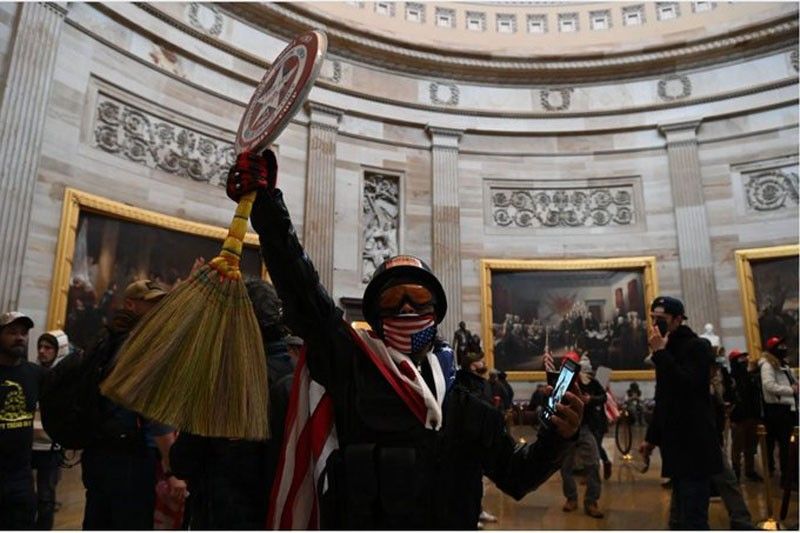
The phrase describes an ancient Chinese torture method to kill a person slowly and painfully by ‘a thousand cuts.’ Maria Ressa, founder and CEO of online news site Rappler, alluded to it in reference to the state of Philippine democracy, saying that it is being slowly undermined through violations and curtailments of civil liberties. The phrase is also the title of a Taylor Swift song about heartbreak, and the title of a documentary about Ressa.
Last Wednesday, January 6, American democracy came under assault by a mob of several thousand, intent in disrupting congressional affirmation of Electoral College votes that would certify Joe Biden’s election as the 46th president of the United States. While the disruption was temporary, the rioting inside the halls of Congress caused extensive damage and five deaths, including that of a Capitol Police Officer who died from injuries received on duty. The event has shaken representatives and senators, along with past and present political leaders nationwide.
They placed responsibility on Trump who at a rally just before the mob assault on the capitol egged his followers to march on the Capitol and “fight like hell” to “stop the steal.” Giuliani, his personal lawyer, stoked the crowd even more by exhorting, “let’s have a trial by combat.” As I write this, the U.S. House of Representatives has impeached Trump for a second time.
The story of this assault, egged on by a sitting president, against a co-equal branch of government, has yet to fully play out. Yet historians, scholars, and journalists, with few exceptions, appear to be of one mind: The horrific events of 1/6, is the result of years of complacency over a president’s divisiveness, half truths, falsehoods and lies, to bend reality into a fantasy world where he wins re-election, but is deprived of it by widespread fraud.
Efforts by Trump’s lawyers to contest election results in over 60 court filings have been summarily dismissed by judges who considered their complaints frivolous or without merit. Despite all these Trump has continued his fantasy claims of re-election by a landslide of votes, setting the stage for the rally near the White House on 1/6, and the subsequent mob assault on the U.S. Capitol.
The assault on the Capitol may be the most horrific of the thousand cuts, but there are other equally serious cuts that Trump inflicted on American democracy: obstruction of justice, violation of prohibitions against foreign and domestic emoluments, soliciting foreign interference in elections (for which he was impeached), violating immigrant rights to due process, separating children from their parents at the border, violating campaign finance laws, and attacks on a free press, to name just the most egregious ones.
The authoritarian strain that Trump awakened, come from a cross section of American society: politicians willing to pander to his lies and falsehoods, members of the police and the military, whites and minorities, and many folks who felt threatened by the erosion of white privilege from the increasing diversity in their communities. Although the 1/6 mob appears to be white, Trump increased his voter base among Asian and Latinx Americans based on exit polls and analysis of voting patterns. The mob may not reflect pro-Trump voter sentiments among Filipinos that guided their choice in the last elections, but it is important to ask, were they attracted to him because of his authoritarian tendencies? E.g., his disdain for the critical press, his brash unapologetic personality and populist pronouncements, his disrespect of the judiciary and the legislative co-equal branches of government if they were not in his service?
His disdain for critical media has a cascading effect on one’s ability to think critically. Who is one to believe if the press cannot be trusted to be objective: the giant echo chamber of those who pander to Trump? Those who trusted Trump and what they heard within his giant echo chamber believed him when he egged them to march to the Capitol to fight hard to “stop the steal”; they believed him when he assured them that he will be there with them — a boldfaced lie, for he soon retreated to the fortress of the White House. This may well be the reason why some protesters did not hesitate to carry and wave the confederate flag (the flag of treason) into the Capitol.
American democracy will survive these cuts, but it has been shocked and considerably weakened. There will be no shortage of advice on how the wounds and divisions that 1/6 has laid bare might be healed or bridged. I will just reiterate what I wrote when I warned about the dangers of Trump’s authoritarian tendencies in early December (Asian Journal Southern California Midweek Edition, December 2, 2020). Americans must confront and make peace with the historic legacies of its slave-owning past: exorcise white supremacy, and the culture of white privilege.
Which leads me to the question of Filipino Americans and their role in getting beyond 1/6. A majority of us are foreign-born —immigrant — although more and more have become naturalized, and voted in the last elections. Our native-born children clearly have a stake in the political future of this country. So do we, foreign-born Filipino Americans since we have thrived under the umbrella of opportunities and liberties in American society. But the strong ties we have with Filipinas, our country of birth, require that we cannot have one standard for Trump, condemning his transgressions against truth, civil liberties, and democracy, while we turn a blind eye to similar transgressions in the political affairs of the Philippines.
President Duterte’s war on drugs, is estimated to have resulted in over 30,000 extrajudicial killings. He has attacked the press, actually moving to curtail the activities of those critical of him through license cancellations, and lawsuits. The most egregious so far is the prosecution of Rappler’s founder and executive editor, Maria Ressa, on alleged violations of a libel law that was retroactively applied — the law did not exist when the alleged acts were committed.
As extrajudicial executions were mounting under the war on drugs, Duterte warned the critical media, “just because you are a journalist, you are not exempted from assassination.”
The United Nations High Commissioner on Human Rights has warned that there appears to be “a pattern of intimidation” of media in the Philippines. Ressa and fellow journalist, Reynaldo Santos Jr. were found guilty of a law retroactively applied to them. At a press conference afterwards Ressa has vowed to continue fighting, to hold power to account:
“Are we going to lose freedom of the press? Will it be death by a thousand cuts, or are we going to hold the line so that we protect the rights that are enshrined in our constitution?”
We also know now that ABS-CBN, a major radio and TV broadcast organization has had to stop its broadcast activities in the Philippines pending a renewal of its broadcast license, despite assurances by members of the Philippine Congress that it can continue its operations pending congressional review of its renewal application.
These attacks on the freedom of the press are but one area of concern regarding civil liberties in the Philippines. Since 2019, international human rights advocate organizations have begun to focus attention on the Philippines. In June 2019, the UN Human Rights Council, adopted a resolution, requesting the Office of the High Commissioner for Human Rights to report on the human rights situation in the Philippines. The adoption of this resolution is unprecedented; it marks the first time that the Philippines is the subject of scrutiny by the Human Rights Council.
Meanwhile, the International Criminal Court (ICC), launched an inquiry on the Philippines war on drugs.
In reaction, President Duterte withdrew Philippine membership with the ICC in March 2020. The ICC prosecutor however continues its inquiry, contending that the ICC has jurisdiction over crimes committed during a period while the Philippines was still an ICC member, i.e., July 2016 to March 2020.
These are disturbing signs about the curtailment of liberties and rights in the Philippines. Yet, judging by Duterte’s continued popularity, Filipinos appear to be more sympathetic towards leaders with strong authoritarian tendencies. Government actions against Ressa, Rappler, and ABS-CBN hardly created a ripple of protest among Filipinos even as those who dared to voice criticism have been threatened or prosecuted on trumped-up (pun intended) charges. Outrage was more pronounced internationally.
This is a dangerous bargain that we are making with the devil, so to speak. Democracy and civil liberties in the Philippines lack the robust rails that they have in the United States. Corruption and political patronage have made us more willing to ignore transgressions. And when the bargain comes due, it might well be death by a thousand cuts.
At the very least, I urge my kababayans to start engaging on the issues of press freedom and civil liberties in the Philippines. Let us educate ourselves on the issues. A good place to start are the reports of international human rights advocacy groups.
* * *
The opinions, beliefs and viewpoints expressed by the author do not necessarily reflect the opinions, beliefs and viewpoints of the Asian Journal, its management, editorial board and staff.
* * *
Enrique de la Cruz, Ph.D. is Professor Emeritus of Asian American Studies at California State University, Northridge.







